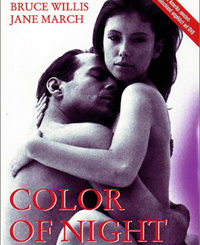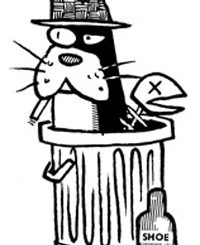 Lost Highway
Lost Highway
with Bill Pullman, Patricia Arquette, Balthazar Getty, Robert Loggia
Written by David Lynch and Barry Gifford
Directed by David Lynch
by William Ham
Watching a David Lynch film is like putting together a jigsaw puzzle with several key pieces missing which forms a picture more abstract and disturbing than the one on the box. Lynchburg is a land with its own, vaporous internal logic, and trying to recreate the experience for anyone else is as futile as recounting a joke that you heard in a dream. He is a true cinematic visionary, one of the few America has, and an admirably infuriating one because he doesn’t really give a damn whether you buy into the vision or not. In its purest form, it is the place where the artistic and the autistic meet.
Naturally, such a vision is squarely at odds with Hollywood convention (and, let’s face it, indie convention as well), and Lynch has paid for it. When he brought a watered-down version of his patented shiver to network TV with Twin Peaks, he was embraced by the public and the media, only to slip out of their fickle clinch merely by doing the same kinds of things he would have done anyway. Creatively, his refusal to compromise was admirable; commercially, it was self-immolating. After his filmic Peaks prequel, the overlong and impenetrable (but intermittently brilliant) Fire Walk With Me, his stock had fallen so precipitously that he opted not to make another picture for five years. True to form, his belated return to the big screen, Lost Highway, makes no concessions to narrative or logical convention, and the result is his most strikingly nightmarish work to date, a multivalent film noir run through an Eraserhead sensibility.
 With the provision that to describe the film is by no means to explain it, the plot goes more or less as follows: Fred Madison (Bill Pullman, looking very much like a dissipated Kyle MacLachlan) is a moody jazz musician married to Renée, a sexy but icy brunette (Patricia Arquette). It’s fair to say that they don’t have the closest of relationships – you could hang Hieronymous Bosch murals in the gaps in their conversation – and the tension is exacerbated by the sudden appearance on their doorstep of mysterious videotapes taken inside their house while they were sleeping (Pullman film reference unintended), although there are no signs that anyone had been there. At a party filled with Renée’s sleazy friends, Fred is approached by a white-faced manikin (Robert Blake) who tells him that not only has he been in their house but that he’s there right now, and has Fred call him there to prove it.
With the provision that to describe the film is by no means to explain it, the plot goes more or less as follows: Fred Madison (Bill Pullman, looking very much like a dissipated Kyle MacLachlan) is a moody jazz musician married to Renée, a sexy but icy brunette (Patricia Arquette). It’s fair to say that they don’t have the closest of relationships – you could hang Hieronymous Bosch murals in the gaps in their conversation – and the tension is exacerbated by the sudden appearance on their doorstep of mysterious videotapes taken inside their house while they were sleeping (Pullman film reference unintended), although there are no signs that anyone had been there. At a party filled with Renée’s sleazy friends, Fred is approached by a white-faced manikin (Robert Blake) who tells him that not only has he been in their house but that he’s there right now, and has Fred call him there to prove it.
After that, things get strange.
That same dark night, Fred wanders into a shadowy passageway in his house, and when he returns, Renée has apparently been murdered, and the evidence (another videotape) seems to show that he did it. He lands on Death Row, where, on another dark night, he undergoes a bizarre metamorphosis. In the morning, Fred is gone and teenage mechanic Pete Dayton (Balthazar Getty) is there in his place, dazed and contused without any memory of how he got there. When he’s released, Lost Highway takes the off ramp to a more familiar-looking stretch of pulpy road, with Pete embroiled in a dangerous love triangle with Mr. Eddy (Robert Loggia), a reptilian gangster with a thing for porn and guns and zero tolerance for tailgaters, and his raven-haired moll, Alice Wakefield. But here’s the pothole: Alice and Renée appear to be the same person.
Beyond that, I won’t betray anything, partly because I don’t want to give away what happens and partly because I’m not exactly sure what does happen. Your ability to take Lost Highway hinges upon your tolerance for ambiguity, plots that unfold intuitively rather than logically, and non-Hollywood resolutions. In fact, it doesn’t appear to have a resolution. But that’s David Lynch for you: if you want answers to the many questions this film raises, you’re gonna have to dig. Tantalizing clues are dropped throughout but spectral loose threads hang off every corner, not because of any structural deficiency but because the skewed architecture hides its bricks in strange places. You wouldn’t have blamed Lynch, the victim of massive hype and its attendant backlash, for skulking back to Hollywood ready to ingratiate in hopes of returning to the public’s good graces. It’s a measure of his almost crazy purity that he keeps the tools of his art – his stunning visual compositions, offbeat cameos (including Richard Pryor, Henry Rollins and Gary Busey), baroque violence mixed with deadpan hilarity (it’s no accident that the grossest image in the film is also the funniest), and the charged air of free-floating erotic menace that permeates every frame – working in their own singular ways without bowing to anyone’s expectations but his own. Lost Highway is the feel-weird film of the year.


